|
FAQs on Betta
Diseases/Health 24
Related Articles: Anabantoids/Gouramis & Relatives,
Betta splendens/Siamese Fighting
Fish, Betta Systems, Betta Diseases, Improved
(Better?) Products for Bettas!,
Related FAQs: Betta Disease 1,
Betta Disease 2, Betta Disease 3, Betta Disease 4, Betta Disease 5, Betta Disease 6, Betta Disease 7, Betta Disease 8, Betta Disease 9 , Betta Disease 10 , Betta Disease 11 , Betta Disease 12 , Betta Disease 13 , Betta Disease 14 , Betta Disease 15 , Betta Disease 16 , Betta Disease 17 , Betta Disease 18, Betta Disease 19, Betta Disease 20, Betta Disease 21, Betta Health 22, Betta Health 23, Betta Health 25, Betta Health 26, Betta Health 27,
Betta Health 28,
Betta Health 29,
Betta Health 30,
Betta Health 31,
Betta Disease
Causes/Etiologies: Determining/Diagnosing, Environmental (By far the largest cat.),
Nutritional, Viral/Cancer, Infectious (Bacterial, Fungal) , Parasitic: Ich/White Spot, Velvet; Senescence/Old Age, Cures/Curatives/Treatments,
FAQs on Betta Medicines:
Betta Medicines period, Antibiotics/Antibacterials, Anti-Protozoals (Metronidazole,
eSHa...), Copper, Formalin, Malachite Green, Anthelminthics, Organophosphates, All Other Betta Med.s (Mela-non-fix,
Quinines...)
|
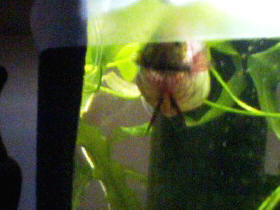
Oomph!
|
 |
Betta Success
Doing what it takes to keep Bettas healthy long-term
by Robert (Bob) Fenner
|
|
Betta rub sores 6/25/09
Dear Wet Web Crew,
<Dawn>
I came to you for concerns about my fish earlier this month, and
the exodus continues. Now that he's healed from his encounter
with the last filtration system I had AND the leaking aquarium,
my Betta Lapis is having another problem.
He's always been a rapid swimmer, and likes to swim against
the tank a bit, darting and doing figure eights at the front of
the tank when he sees me. But I've noticed something since I
attached the light to his tank that has me worried. His scales on
the front of his head are somewhat dull, not as shiny as I
remember them, and I've also noticed in the last two days,
three small white spots on his face around his mouth.
<Nothing to worry re>
I've been keeping an eye on them for the last two days, and
more have not appeared, and they haven't changed size. The
way Ick was described to me it's supposed to look like salt
or sugar, which this doesn't (at least not to me). Could it
be a fungal infection?
<Mmm, no>
I'd read somewhere that they can get 'pimples'? My
concern is that it might be some sort of infection, because
periodically when he's darting around now he'll open his
mouth. He won't open his gills at the same time as he might
if he were flushing his gills, but his mouth opens and shuts as
if gasping or trying to grab at something under water. He's
still eating with enthusiasm, and he's definitely not
lethargic except when he's been in "isolation" for
a while. When I'm home I'll put a cloth over his tank for
a little while during the day because there is no low traffic
area for me to put him in and I worry that my constant passing by
will stress him out and make him sick. Even then he's not
really lethargic, but a little mopey, as if he misses me. He
perks right up when he sees me again.
As for the tank information I'm sure you'll need:
Temperature: 82 F
PH: 7.0
Ammonia: 0
Nitrate: 0
Nitrite: 0
Last water change: Sunday 6/21
Last water test: Sunday 6/21 (I always test the water before and
after a water change, just to be sure)
Medication/Additives: StressCoat+, Melafix (added 6/24 when I
noticed spots weren't gone), aquarium salt (added at water
change)
<I'd leave off with the salt>
I showed a picture of Lapis to our resident Betta
'expert' at my local fish store, and she said she thinks
it is most likely Ick from the pictures I had available, and she
suggested a medication that they use frequently for fish
suffering from that parasite (QuICK Cure, which has Formalin and
Malachite Green).
<Too toxic>
Due to the harsh nature of both of those medications, I wanted a
second opinion before I dosed him because I don't want to
dose him with the medication if it ISN'T Ick. I always seek a
second opinion because you never know what a fish enthusiast has
learned and what they haven't.
<Not a disease...>
Enclosed is a picture. I've circled the spots. This was the
best I could do because he doesn't sit still very well for
the camera. He's a bit of a fidget (hehe).
Please help me? I don't want to give him the wrong medication
or give him something he doesn't need.
<These are sores from the fish rubbing his face on the
container... interacting with you, the world. Not to worry. Bob
Fenner>
|
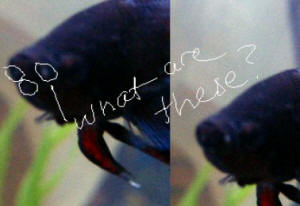 |
|
Betta with tumor that...exploded? (RMF?)
6/18/09
Hello!
<Hi,>
I've spent quite a bit of time on your website (along with
many, many other sites) trying to figure out what happened/is
happening to my Betta, Pat. My apologies for the number of
pictures, but I figured it would be best to show you what's
going on rather than attempt to describe it.
<It looks like Lymphocystis, or something similar, such as
Fish Pox.>
In September of last year I bought this Betta, Pat (short for
Patriot since he is vaguely red white and blue). He seemed
perfectly healthy and in fact was for quite some time, up until
May 21st of this year. I have been
keeping him in a gallon fish bowl with glass stones on the bottom
and some Roman columns that he rather seems to enjoy. Because the
house is kept kind of cold, I keep the bowl on a heating pad
turned to either medium or high.
I am sure to clean the water often (at least once per week and a
half) and feed him a variety of foods: the Betta pellets, flakes,
bloodworms and most recently, crisps.
<Lymphocystis is viral, but the balance of evidence strongly
favours the argument that the virus becomes dangerous only
because the fish's immune system is chronically weakened,
specifically by environmental and water quality issues. So, you
need to review how you're keeping your Betta. The only viable
way to maintain a pet Betta (as opposed to what breeders might do
in heated fish rooms) is to keep a Betta in a 5-gallon or larger
tank; to use a heater set to 25-28 degrees C; and to use a filter
to keep the water clean, ideally a sponge filter. If you
aren't doing all these things, that's your problem right
there.>
I do not monitor the ph (although I realize now that I should)
but have a water conditioner for Bettas that I use each time I
clean the bowl that "breaks the chlorine bond" and
makes it safe for him.
<I'm not sure you understand what you're doing, which
likely exposes the Betta to environmental stress. Dechlorinator
is fine and good, and certainly you should add an appropriate
amount to all new water added to the tank. Water changes should
be 25% per week, assuming a 5-gallon tank with a filter
installed. But water changes don't remove the need for
filtration unless you're changing 90% of the water daily,
which is what serious breeders do.>
So. May 21st I'm cleaning out his tank and take a few photos
of him for my own fun. I didn't really take notice then, but
a white spot had begun to grow on his lower tail fin
(pat1.jpg).
<Lymphocystis.>
As the days passed, I noticed that the white spot was growing,
like a tumor. Pat remained frisky, eating plenty, moving around
and "puffing up" when I came too near the glass. In
other words, other than the enormous tumor, he was acting normal
and swimming fine (pat2, 3, and 4.jpg). At this point I did some
research online and bought Betta Fix, thinking it was a possible
parasite or viral infection. I started treating him with it for a
week, then changed the water as directed.
<Betta Fix is a complete waste of money. Indeed, any
"remedies" recommended that are based on tea-tree oil
or salt are largely worthless.>
The tumor seemed to stop growing and wasn't affecting his
swimming or behavior, so I decided not to do a second treatment.
Today, I go to feed him dinner and this is what I see (pat5,
6.jpg).
His tumor had, for lack of a better word...exploded. Disappeared.
There is a hole where the white lump used to be, and a piece of
jagged fin. I don't know what to think--no other site has
photos of this kind of tumor, or described one that just seemed
to drop off.
<Lymphocystis has a distinct growth and decline cycle,
sometimes takes weeks, other times years. You've been lucky
here, in a way, and now know that to prevent more problems, you
should upgrade the aquarium in terms of space, heat and
filtration. I'd also recommend strongly treating for Finrot
and Fungus to prevent secondary infections, which tend to be
common when the skin of a fish has been broken. Good medications
that treat both diseases include Seachem Sulfathiazole and
Seachem PolyGuard. The important thing is not to imagine that
tea-tree oil or salt would help!>
I tried looking in the tank to see if it was possibly sitting on
the bottom, but I can't really distinguish between a possible
growth and the other "trash" on the bottom of the bowl
(I am guilty of feeding him a bit too much, so the excess food
sinks to the bottom). He still is eating, moving around, acting
like he always has. I am at a total loss.
I guess what I want to know is if there is anything specific I
should be doing (medication-wise, food-wise), watching for, and
if this is something he can recover from.
<Do review the needs of Bettas. They can't be kept in
unheated bowls as small as yours, and invariable die from
something or another when kept thus. I do make this point
repeatedly here, but I'll say it again: Bettas
are tropical fish. They need all the same things as other
tropical fish. If you don't have the space/money/inclination
to keep tropical fish correctly -- Bettas or otherwise -- then
don't keep them at all.>
Thank you for this site--it surely makes me feel better that
I'm not alone!
Stephanie
<Happy to help. Neale.>
<<Appears viral, cancerous... only "internal"
self-cure is possible... RMF>>
|
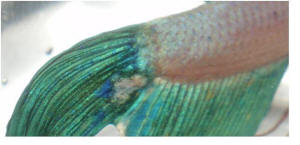 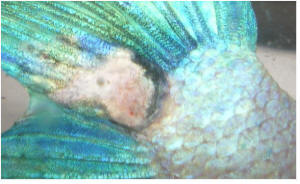
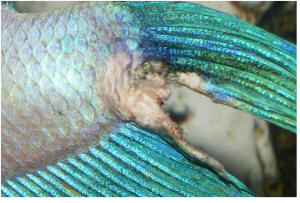 |
HELP my Bettas are going crazy 6/17/09
Hello Crew,
I need help and I need it fast! Earlier today one of my female Bettas
was acting weird. She looked as if she was squeezing her-self, the she
would swim extremely fast jumping out the water (in the tank, past the
surface) and blowing bubbles. Now my Crowntail Betta is acting weird.
He keeps lying at the bottom of the tank for long periods of time then
racing to the top, jumping out the water, and not eating. This is out
of character for both of them and my male Betta usually eats way more
then my other five Bettas combined! Please help me. I'm desperate
for advice
Thank you in advance
Brittney
<Something reads as being very wrong here... I suspect some source
of poisoning... perhaps a nearby kitty litter pan... or household
cleaner has wafted ammonia or other material into your Betta
systems' water... Too late to counter the present circumstance, but
I'd be looking for a root cause here, and fixing it. Bob Fenner>
Re: HELP my Bettas are going crazy 6/17/09
Thanks for responding Bob but shortly after I e-mailed you guys last
night my Crowntail died. I switched out the water in both tanks, the
female started acting normal right away but the male laid on the bottom
still. I
even brought him out of the tank to get a gulp of air and put him back
immediately but I couldn't help him. Thank-you so much for your
help
Brittney
<... Mmm, but what of the real cause here? Perhaps some sort of
cover over the tanks would be of help? BobF>
|
Beta 6-15-2009
My Beta has a fungal growth growing on it's
dorsal fin area-how do you suggest I treat this??
<Anti-fungal medications (not salt, and not tree-oil remedies
such as Bettafix, Pimafix or Melafix) should do the
trick.>
Appreciate any insights you can offer
<I'm hoping your Betta (not the two Ts; the word rhymes
with "better") is in that glass thingamajig just so you
could photograph it. Contrary to what the guy in the pet store
might suggest, Bettas cannot be kept in unheated glass bowls.
They are -- and this surprises some people -- actual fish.
Like any other tropical fish they need heat and filtration. Just
to run through the basics, the MINIMUM requirements for a Betta
are a 5 gallon aquarium, a heater that keeps the water at 25-28
degrees C, and a filter of some kind, ideally an air-powered
sponge filter but other types will do provided the water current
isn't too strong. They CANNOT be kept in bowls without
heaters regardless of how warm your house is -- unless you happen
to live in tropical Southeast Asia where they evolved!
Angle-poise lamps and other such "solutions" won't
work. I mention all of this because Bettas develop fungal
infections when kept badly; their immune system weakens, and
fungal spores are able to 'germinate" on the surface of
the fish, leading
to the cottony threads you can see. Only by correcting the
conditions will anti-fungal medications such as API Fungus Cure,
Seachem Sulfathiazole and Seachem ParaGuard work. It's a
shame some people buy Bettas assuming they're virtual pets
you can keep in a bowl of water; you can't. Don't be one
of those people!>
Greg in Woodland, CA
<Cheers, Neale.>
|
 Mmm,
maybe viral. RMF Mmm,
maybe viral. RMF |
|
Re: Beta 5/16/09
Well thanks for your response, but, in this case a picture is not
worth a 1000 words!! You are mistaken. I put the Betta in the
vase so I could treat him with aquarium salt as the counter help
at Pet Smart suggested, as I looked for an anti-fungal
remedy.
<OK.>
The Betta resides in a 60 gal tank, with some other 20+ fish. He
developed this growth in that tank. I do monthly maintenance on
the tank, change the water frequently. So, without feeling too
smug about my tank housekeeping, I return to my original
question: What should I do to treat this problem??
<As I said, don't use "junk" remedies like salt
or tea-tree oil, and instead use valid anti-fungal medications
such as those listed in my previous e-mail. Use as instructed,
and the other fish and the biological
filter will be unharmed; since fungal infections are usually
caused either physical damage (such as fighting or nipping) or
environmental shortcomings (ammonia, nitrite above 0) review both
and act accordingly.>
So I add salt to my 60 gal fresh water tank, or just hope for
time to heal this thing?
<Neither.>
Greg
<Cheers, Neale.> <<Medications won't fix this...
growth... Maybe time, good care can/will. RMF>>
|
|
Lapis a tail biter? 06/08/09
I've had Lapis about two weeks, and he's been fine until
yesterday. When I left my place Sunday morning he was fine, but
when I got back at 4:30 in the evening, about six hours later,
his tail was tattered and there was what appeared to be clotted
blood stuck to some of the shredded parts.
<Usually such "shredding" is either physical damage,
e.g., from another fish, or else Finrot. However, Finrot takes
some time to develop, and if it really did go from perfect
finnage to shreds in size hours, Finrot is
unlikely to be the issue. That said, it's always worth
checking water quality.>
He's in a 5 gallon tank with a heater and a Marineland Duetto
Mini filtration unit, and completely by himself.
<Do check the filter isn't over strong for the aquarium;
it is possible for a Betta to get stuck to the inlet, and in
trying to work itself free, shred its fins. That would be
consistent with seeing just a single fin damaged,
as would happen if one fin was stuck to the filter. It goes
without saying that air-powered filtration systems, such as box
filters and sponge filters, are the correct choices for Betta
aquaria.>
The only changes I have made to his environment was to add a
couple of decorations to what was already there. There was
already a lace rock and four soft plastic plants in the tank. I
only added three small pieces that look like coral. I removed
them immediately when I saw his fin was damaged, thinking one of
them might have been the culprit, because there was no sign of
damage beforehand.
<It's improbable that a fish could do this kind of damage
merely by swimming past an abrasive rock; this is much more like
ripping rather than scratching.>
This is not the first Betta I have had, and the last one died of
fin rot; and I don't remember it coming on this fast. Could
he be biting his tail??
<No.>
Could he have gotten his tail stuck in the filtration unit
somehow??
<Yes.>
Included is a before and an after photo.
<Quite a difference!>
I've changed his water, removed the other decorations except
what was originally in his tank, and added a water conditioner
after the water change, Bettafix, and aquarium salt. Is there
anything else I should do??
<Well, you could stop with the salt and the BettaFix (it's
a Betta by the way, pronounced like "better", not
"beater"). Treat with a reliable, vet-tested medication
appropriate for Finrot, such as Maracyn, to prevent
secondary infection. Tea-tree oil is pretty unreliable, so while
cheap, it's also useless.>
Is there anything else I CAN do??
<Review water quality, filtration and act accordingly. Cheers,
Neale.>
|
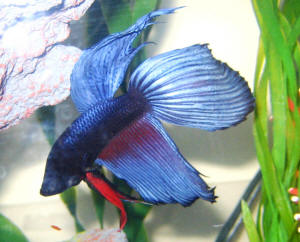
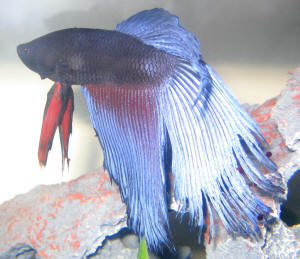 |
Re: Lapis a tail biter?
One more quick question. I just did the water change yesterday...
do I need to do another before I start using Maracyn, or is it
okay to use it even though the BettaFix and salt are in the
water?
<Personally, I'd do the water change. Replacing 25% of
what's in the tank will certainly do no harm. There really
shouldn't be any interaction between the Maracyn and salt,
since you can use Maracyn safely in fresh and saltwater aquaria.
Bettafix is more of an unknown quantity, but I'd expect it to
have little effect either way.>
(sorry about the spelling error) Also, I read on a forum site
through searching about Bettas and Fin Rot that when using
medication there should be some aeration of the water in the
tank, and suggested an airstone.
<Indeed. Most medications are irritants or poisons; that's
as true for human medications as those used for animals. While I
wouldn't expect a Betta to be too fussed about oxygen -- it
is, after all, able to breathe
air -- making sure the tank had good circulation would do no
harm. Adding an airstone would probably be overkill if the tank
already has a filter; but it could be a make-or-break addition of
the sick Betta was in an
unfiltered bowl.>
Would that be a good idea, or would it stress the fish out too
much to add something to the tank when he may already be stressed
and sick.
<I don't think you need to add an airstone, but if you
did, I can't see it would do any harm. Cheers, Neale.>
Re: Lapis a tail biter? (RMF, opinions on Melafix vs.
Maracyn) <The one is a sham, the other a real antibiotic>
06/08/09
Thank you so much for your advice! I went out to a local fish
store today and they tested the water for me, they said
conditions were perfect, so the water quality was not to blame
(which is funny because I had not really been testing for
ammonia, etc.) I took the same pictures in to the girl they had
on staff that has had Bettas frequently.
<Well, while this is good news, and not something I doubt, be
open minded:
water quality can fluctuate, particularly immediately after
feeding.>
She said that it did not look like fin rot to her, and she
hesitated to recommend starting with Maracyn since my tank was
still becoming established as far as good bacteria is concerned.
She recommended I try Melafix for now, at half the dose due to
tank size, and keep an eye on him.
<Melafix is not reliable. I have no idea why people sell it.
Maracyn in erythromycin, an antibiotic widely used and trusted by
vets and doctors; Melafix is tea-tree oil, and simply isn't
used by vets and doctors.>
I also purchased a new filtration system, a sponge filter. I just
put it in his tank and already he seems to have relaxed a little.
I think the current on the other filter was far too strong for
him. He also seems fascinated by the bubbles it makes (the one I
bought can be attached to an air stone to aerate the tank while
filtering). He doesn't seem sluggish and he's still
eating, so he might be over the worst of it (if there even was
one, since he was swimming around with his tail like that as if
nothing had happened).
<Cool.>
I will keep an eye on him, and if I don't see improvement
I'll most likely get the Maracyn, but I think he's going
to be okay, since there hasn't been any change (for the
worse) to his condition since I found him last night. I really
appreciate all your help. You have no idea how great it is to
have someone to ask questions who actually KNOWS what they're
talking about.
<Happy to help.>
His poor tail though... I can't wait until it heals... lesson
learned though... don't trust someone who doesn't know
the first thing about caring for Bettas. That's how I ended
up with the filtration system I did in the first place.
*sigh*
<The outlook is good; fish can repair their tails very well,
and the Melafix won't prevent that. Probably won't do
much to help either, but we'll let that pass for now. Good
luck. Neale.>
Re: Lapis a tail biter? 6/11/09
Neale,
I just wanted to say again - THANK YOU!
<You're welcome.>
He's already on the mend, and the tail is looking much
better!!
<Cool.>
I was so worried about him I could barely sleep until I started
to see the clear membranes that were indicators of his fin
healing. His tail has already been partially restored. I had no
idea they heal so fast.
<With the right medications and good water quality, yes, fish
are astonishingly resilient.>
Thank you so much for your help!
Picture was taken yesterday. ^_^ He looks so much better!
<Indeed he does! I like the sponge filter you're using;
ideal for Bettas.>
I bought a water testing kit so that I can keep track of his
water conditions too, so hopefully all will be fine from now
on.
<I hope so too. Good luck, Neale.>
>Hi Bob,
> You might want to add to the title "Re: Lapis a tail
biter?" something like "Look what happens when you
switch from Melafix to a *real* medication!"
> Cheers, Neale
<Ah yes. Will do. BobF>
Re: Betta now better... 6/26/09
Mr. Fenner,
Thank you so much for responding. I will hold off on the medicine
and just keep an eye on the spots just to be on the safe side.
Lapis seems to be doing okay, but I'm an ever-worried Betta
mommy. Someone should tell PetSmart that malachite green
isn't very good for the fish... they dose the water that the
little Bettas live in (in those little cups).
<Lesser of two evils... while this protocol surely increases
the rate at which their Bettas die before sale, they'd lose
even more if they didn't because water quality is so
bad.>
They say it's to "keep them from getting sick" but
I agree with the mom and pop fish store I use when they said
it's probably more because they don't want to clean the
water (laziness).
<Quite possibly the case.>
The mom and pop place doesn't use it on the Bettas, just
conditioned tap water, and their Bettas live quite well (my first
Betta was from them and lived for 3 years). They did recommend
the QuICK Cure to me, but she also stressed I might want to use
it at half strength or something because the medicines are often
stressful on the fish's system. That's the reason I
contacted you, I felt it was better to seek a second opinion.
Thank you so much for your help.
BTW, tell Neale (who helped me when Lapis got his caudal fin
stuck in the old filter I had) that Lapis tail is almost
completely healed and I really appreciate the help on that
too.
<I'm glad everything worked out well.>
I'm amazed at how quickly he healed.
<Under the right conditions, fish are remarkably healthy and
resilient animals. Cheers, Neale.>
|
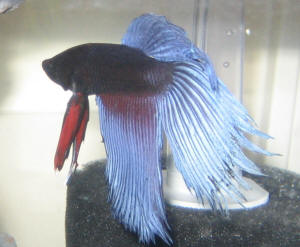 |
Betta question... dis., no info. or pic...
6/9/09
I think my Betta has Columnaris - he has white stringy material hanging
from his body and exhibits heavy breathing. What can I do?
Thanks, Rachel
<... Mmm, send along more data and a good image or two. Read
here:
http://wetwebmedia.com/FWSubWebIndex/bettadiseases.htm
and the linked files above for input, examples. Bob Fenner>
Sick Beta, Help! (Yet another Betta in a tank that's too
small...) 6/11/09
Hello,
Our Beta, Max, is sick and we're not quite sure what is wrong with
him, though reading through some of your FAQ's it seems like he may
have a combination of issues.
<It's a Betta, by the way, pronounced like "better",
not "beater".>
I purchased our Beta at Christmas 2008, so we've had him a little
over 5 months. He's usually quite active in his tank. We initially
had him in a large bowl shaped vase, but moved him a few months ago to
a filtrated 1.5 gallon tank.
<Still too small. Despite what salesman say, you need at least 5
gallons for Bettas. They are -- and this might be a surprise to some --
living things. Indeed, they're fish. So just like any other fish
they need clean
water, heat, filtration, and oxygen.>
Here is the link to it incase you need a visual
http://www.petco.com/product/102093/Tetra-Water-Wonders-1-5-Gallon-Aquarium-Kit.aspx?CoreCat=OnSiteSearch
<Waste of money.>
He has rocks and a few plastic plants in there and he seemed to be
quite happy about his new digs. Last week I went to feed him and way
too many pellets came out of the food jar (I'd say at least 30). I
thought about fishing them out, but figured it wouldn't hurt to let
him eat them. But now I understand that overfeeding can lead to swim
bladder disorders.
<No, this isn't what happens. Who told you this?>
In any case, several days later we noticed that his fins were very
tattered looking and not long and luxurious like they used to be, and
he had some white, fluffy looking stuff on his head.
<Fungus; almost certainly you have poor water quality, in part
because the tank is too small. What's the ammonia concentration? Or
the nitrite? You should have a test kit for at least one of
these.>
He also has a strange spot on his back flank that looks like it might
be part of his body protruding from his scales, but I can't be
sure. He was floating at the top of his tank in the back corner and
when he tried to
swim he was swimming sideways, as if he was having trouble with
equilibrium or something. After some research online we thought the
fluffy white stuff was probably a fungus of some kind and we went to a
tropical fish store nearby that gave us some antibiotics for the
tank.
<Antibiotics are for bacterial infections, and won't cure fungal
infections.>
We came home and emptied his tank and rinsed it all out with hot water
and rinsed all the rocks and plants. We replaced the water with
filtered tap water and placed Max back in the tank adding the
antibiotics as described on the package.
<Filtered tap water is fine, provided you know the water chemistry.
For example, water that is too soft would be very bad for these fish.
Indeed, simply changing 100% of the water is daft, because that runs
the risk of exposing the fish to severe water chemistry changes. Only
change 25% of the water a time, up to 50% if there's an emergency,
leaving at least 24 hours before doing additional water
changes.>
We've been using that for about 4 days and he does not seem to be
improving much. He just sits at the back corner of his tank at the
surface and hardly moves.
<Review the basics: heat and filtration. Bettas are tropical fish so
need a tank with a heater, obviously, and the temperature should be
around 25-28 degrees C. They cannot be kept in unheated tanks, unless
you happen to live in tropical Southeast Asia. The filter should be
primarily a biological filter, so things like carbon are irrelevant.
Instead ensure you have 0 ammonia and 0 nitrite at all times. Water
chemistry isn't critical, but should be around pH 7 with a moderate
hardness level, around 10 degrees dH.
There's no need to add salt, and in fact salt is used to detoxify
nitrite, so aquarists who recommend salt are essentially admitting they
cannot keep their water conditions correctly.>
He doesn't respond to us if we talk to him or if we remove the lid
of the tank at all.
<None of these things matter to a fish. He's a fish! What he
wants is heat, clean water, and the right water chemistry. In a 5
gallon tank with a heater and a biological filter this should all be
very easy to provide.>
When we fed him after cleaning the tank he seemed hungry, but now he
seems disinterested in food at all. After reading one of your posts, I
am assuming we should not feed him for a day or two incase he's
suffering from being overfed.
<Not the issue here.>
Is there anything else we should or could be doing to get Max healthy
again?
<See above.>
Also, if he has some kind of fin rot, will his fins grow back at all?
Thank you for your help!
-Emily
<Emily, I fear you've got a lot of reading to do before having
any success here. Please understand that fish have needs; they're
not "virtual pets". So while shops will be only too willing
to sell you a Betta and a jar to
keep him in, they're taking your money in exchange for a fish that
will surely die. So don't be too angry with me for being frank;
instead, be cross with yourself for not doing research first, and cross
with the pet shop for taking advantage of you. If you provide the Betta
with a heated, filter 5 gallon or larger tank, and then treat for
Fungus and Finrot together, e.g., treating with Seachem Paraguard or
Seachem Sulfathiazole,
I'd expect your Betta to get better and his fins to heal. Fail to
do those things, and he'll die. Cheers, Neale.>
Re: Sick Beta, Help! (Yet another Betta in a tank that's too
small...) -- 06/12/09
Thank you for your response. We will try the larger tank with a heater
and treat for fungus and fin rot.
<Good to hear, and good luck! Cheers, Neale.>
|
Emailing: Fish 001, Fish 002... Betta vision/hlth.
6/8/09
Hi! I am writing about our Betta. His name is Only Named Fish
(just Fish for short, my then 3 year old named him!) Fish is now
over 2 and a half years old.
<A very good age for a Betta.>
He has always been feisty and ornery. He taps the bowl if I
forget to feed him! About a week ago I noticed a perfectly round
white spot "on" his eye, on closer inspection it is
inside the clear of his eye.
<It's mechanical damage; i.e., he bumped into something,
and the outer surface of the eye became damaged and died, hence
the white. Not really much you can do beyond making sure the
infection doesn't spread further.
The use of a reliable anti-bacterial used for treating Finrot
would be appropriate. By this I mean something like Maracyn or
eSHa 2000, as opposed to salt or tea-tree oil (Maracyn, Bettafix
and other make-believe solutions).>
I haven't noticed any behavior changes, and he still eats
like a piranha, but I am pretty sure he can't see out of that
eye (I had a terrible time getting a picture because he kept
turning his good eye to me). When I saw the dot, I, of course,
panicked and headed for the store. They told me it was either
PopEye or Ick and gave me some stuff to treat it.
<Poor advice.>
The thing is, I came home and did some research and it looks
nothing like any of the diseases. Could he have just whacked
himself on the bowl?
<Yes, or more likely, a flat rather than curved surface, e.g.,
the filter, the hood, or a rock.>
Or could it just be old age?
<Certainly, as fish get older, their repair and immune system
likely gets less effective, so problems such as this one become
more probable.>
Though the pictures aren't perfectly clear, you can see the
dot in his eye in both. (No, that isn't a reflection.) Thanks
so much for your great site and all the info. This is the first
time my little guy has been sick and I kind of like his ornery
old hide! Thanks
Alexis
<Cheers, Neale.>
Re: Emailing: Fish 001, Fish 002
Thanks a bunch! I appreciate the advice. I will get an antibiotic
right away.
Alexis
<Good luck! Neale.>
|
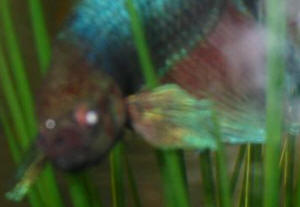 |
|
If all else fails...? 06/04/09
Hello again to the WWM crew!
<Hello,>
I have written in before asking about problems with my mollies,
but this time I am writing about my Betta, Betty. Betty lives in
a 5 gallon heavily planted tank by herself. Temperature around 80
degrees Fahrenheit, nitrites zero, ammonia zero, and nitrates
zero. Prior to her move into this tank, she lived in a 55 gallon
tank with tetras but she was upgraded to a home of her own and
really seems to like it.
<Cool.>
I purchased Betty at a corporate chain, Petco. Obviously, I have
no way of knowing how old she is. I have had her for about 6
months now. After moving her from the 55 gallon into the 5 gallon
tank, I noticed that she started getting larger. I cut back on
feedings to once every 2-3 and started treating her with Epsom
salts. The bloating did not go away. The current treatment is
still 2 teaspoons of Epsom salts in the 5 gallon tank during the
water changes. The water changes are done weekly.
<This "bloating" is not uncommon among female
Bettas. Overfeeding may well be part of the issue, as might
constipation, but I'd also factor in possibilities such as
egg-binding and simple dropsy. It's not easy to tease these
possibilities apart, but at a pinch, I'd order overfeeding as
the most common problem, dropsy the second, constipation the
third, and egg-binding a distant fourth. Dropsy isn't any one
specific disease but a symptom caused by a variety of things that
lead to issues with osmoregulation. There's no easy fish, but
Epsom salt plus the use of antibiotics may help. Certainly stop
feeding altogether, and if, after a week, the swelling has gone
down, then overfeeding and/or constipation were the likely
causes. If the swelling doesn't change, the look at Dropsy,
particularly if the scales seem raised from the body. Egg-binding
isn't easy to cure once established, but if she's merely
ripe with eggs rather than bound, introducing a male might lead
to laying of eggs, and if that happened, you'd have your
answer.>
Her bowel movements are stringy and sparse; her output is
definitely not what it used to be. I have attempted to feed her
peas, bloodworms-both freeze dried and frozen, algae, and other
foods that search engines said would relieve possible
constipation. She refuses to eat any of it and will only eat a
little bit of flake food.
<Lack of interest in food does often go along with parasitic
or bacterial infections, and these in turn often lead to
Dropsy.>
Her feedings are still cut back to every 3 days, but nothing has
made a difference. The scales are not pineconed, so it does not
appear to be dropsy.
<I'd still consider this possibility.>
My fiancée even suggested a possible tumor or even
if she had eaten a small piece of gravel when she was in the 55
and it never came out.
<Tumours do happen, but usually result in asymmetrical
swelling, so one side of the body bulges. As for swallowing
gravel, because of the way fish work, it's pretty unlikely.
They have gill racers in the throat that allow them to swallow
substrate and sift out food without choking.>
Behaviorally, she hangs out in a corner and rarely comes out
except to flare up at the cell phone (with which I used to take
this picture; I'm sorry about the quality!). The only way to
find out would be to cut her open, and I'm not sure I could
bring myself to do that even after she passes away. Betty used to
be red but her belly is now so bloated and distended that it is
white in color. Attached is a picture of her that I took this
afternoon. Does anyone on the crew know what else could be
causing possible Betta bloat besides constipation and/or
dropsy?
Thank you much for the help!
Jenni
<Cheers, Neale.>
|
 |
 |
Betta Success
Doing what it takes to keep Bettas healthy long-term
by Robert (Bob) Fenner
|
|
|

